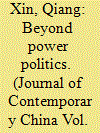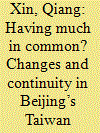|
|
|
Sort Order |
|
|
|
Items / Page
|
|
|
|
|
|
|
| Srl | Item |
| 1 |
ID:
095544


|
|
|
|
|
| Publication |
2010.
|
| Summary/Abstract |
Facing the ever-growing interdependence across the Taiwan Strait, Mainland China's strategy towards Taiwan is undergoing a profound change, that is, transcending the staunch realpolitik mentality and turning to an institutional arrangement in policy making. Especially since President Hu Jintao took up his position, the Mainland has endeavored to improve cross-Strait relations through the institutionalization of a series of sensitive issues, such as the proposals and signatures of some long-term accords aiming to advocate economic cooperation, promote social exchanges, weaken political opposition and foster mutual trust. By taking the Mainland's national development strategy shift, Taiwan's domestic reality and 'institution deficit' in cross-Strait relations into consideration, this paper analyzes the reasons, efforts and features of the Mainland's recent institutional-orientated policy transition.
|
|
|
|
|
|
|
|
|
|
|
|
|
|
|
|
| 2 |
ID:
112830


|
|
|
|
|
| Publication |
2012.
|
| Summary/Abstract |
Since the mid-1990s, China's navy has witnessed remarkable progress in force-projection capability build-up which has enabled it to move from coastal waters to the deep oceans. The continuing naval modernization process has aroused deep-rooted suspicions and two prevailing assumptions that these new capabilities will be used to challenge US maritime dominance and to fulfill national reunification of Taiwan. This article examines the validity of the hypotheses and points out that China has neither the intention nor the capabilities to pursue these objectives. By referring to the priority on China's defense agenda and imminent threat identification, this article suggests that naval modernization will enhance China's capabilities to contribute to global commons, including protection of sea lanes of communications and addressing nontraditional security threats, which will provide new opportunities and dynamics for China-US cooperation, rather than for confrontation.
|
|
|
|
|
|
|
|
|
|
|
|
|
|
|
|
| 3 |
ID:
185553


|
|
|
|
|
| Summary/Abstract |
Since the pro-independence Democratic Progressive Party won the 2016 election in Taiwan, Beijing’s Taiwan policies have witnessed some strategic and tactical adjustments. This article attempts to clarify the underlying changes and continuity in Beijing’s Taiwan policy by addressing three vital questions. First, for Beijing, what is the prominent concern for its Taiwan policy making? Second, what is the top priority for its ‘great rejuvenation’ ambition? And third, what is Beijing’s guideline for dealing with Taipei’s reluctance to accept reunification? This paper argues that, firstly, how to prevent Taiwan’s de facto independence from perpetuating has become the primary challenge for Beijing, given Taiwan’s inclination to indefinitely maintain de facto independence. Second, Beijing still prioritizes the achievement of comprehensive modernization before the fulfillment of reunification within its overarching ‘national rejuvenation’ timetable. Third, discouraged by Taiwan’s anti-China dynamics, Beijing has switched its guideline for promoting unification from ‘placing hope on the Taiwanese’ to ‘placing more hope on the mainland itself’.
|
|
|
|
|
|
|
|
|
|
|
|
|
|
|
|
|
|
|
|
|